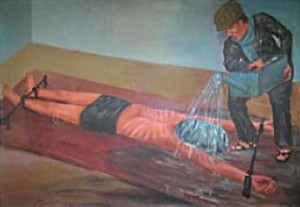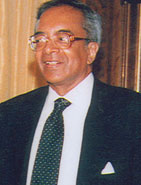Torture and its Prohibition in International Law
‘Man, when perfected is the best of animals, but when separated from law and justice, he is the worst of all’
Aristotle -Politics
Torture (Latin torquere: to twist) has been described as infliction of severe bodily pain either as punishment or to compel a person to
confess to a crime or give evidence in a judicial proceeding. Among primitive people torture was used as a means of ordeal and to punish captured enemies. Examination by torture often called the ‘question’ has been used in many countries as a judicial method to extract evidence and confessions. It involves the use of instruments designed to inflict pain to extort evidence from unwilling witnesses.
Torture and heresy
In ancient times in Athens slaves were examined by torture. The statesman Cicero and other enlightened Romans condemned its use. Although until the 19th century canon law of the Christian Church did not sanction torture, it was adopted under treason law against suspected perpetrators of heresy. Soon after the institution of Inquisition, Pope Innocent IV issued a decree in 1252 A.D. to magistrates to have persons accused of heresy tortured to elicit confessions against themselves. The horrors of torture from the 14th to the 16th century brought about a progressive change of sentiment, which eventually led to its abolition in Europe. By the middle of the 18th century it was abolished in France, Prussia, Saxony ,Austria and Switzerland. The use of torture in Roman Catholic countries was banned by a papal edict issued in 1885.In the 20th century its use was revived in a major scale by National Socialist,Fascist and Communist regimes in Europe.
Sri Lanka a signitory to anti torture conventions
Torture is expressly illegal in most countries following the signing of United Nations conventions. Article 11 of the Constitution (1978) of Sri Lanka provides that ‘No person shall be subjected to torture or cruel, inhuman or degrading treatment or punishment.’ Article 5 of the Universal Declaration of Human Rights (UDHR of 10th December 1948) provides that: ’No one shall be subjected to torture or to cruel inhuman or degrading treatment or punishment’. Thus Article 11 of our constitution seems to have followed the provision in the UDHR.
Degrading treatment
Article 7 of the International Covenant on Civil and Political Rights(ICCPR of 23rd March 1976 ratified and acceded to by Sri Lanka on 11th June 1980)provides that: ’No one shall be subjected to torture or to cruel inhuman or degrading treatment or punishment. In

Waterboarding in Cambodia during the Khmer Rouge regime. Painting by former prison inmate Vann Nath at the Tuol Sleng Genocide Museum. Taken from Wikipedia
particular, no one shall be subjected without his free consent to medical or scientific experimentation.’ Further, Article 1 of the Convention against Torture and Other Cruel Inhuman or Degrading Treatment or Punishment (CAT of 26th June 1987 ratified and acceded to by Sri Lanka on 03rd January 1994)states:
1) For the purpose of this Convention, the term ‘torture’ means any act by which severe pain or suffering, whether physical or mental, is intentionally inflicted on a person for such purposes as obtaining from him for an act he or a third person has committed, or intimidating him or coercing him or a third person, or for any reason based on discrimination of any kind, when such pain or suffering is inflicted by or at the instigation of or with the consent or acquiescence of a public official or other person acting in an official capacity. It does not include pain or suffering arising only from inherent in or incidental to lawful sanctions.
2) This article is without prejudice to any instrument or national legislation, which does or may contain provisions of wider application.
Sri Lanka promulgated Convention against Torture and Other Cruel Inhuman or Degrading Treatment or Punishment Act No.22 of 1974 certified on 20th December 1994 incorporating the provisions of the UN Convention.
Apart from the United Nations Conventions, Article 3 of the European Convention on Human Rights provides that ’No one shall be subjected to torture or to cruel inhuman or degrading treatment or punishment.’ Article 5(2) of the American Convention on Human Rights under the title ‘Right to Human Treatment’ states ’No one shall be subjected to torture or cruel inhuman or degrading treatment or punishment. All persons deprived of their liberty shall be treated with respect for the inherent dignity of the human person.’
African Charter
Article 5 of the African Charter on Human and Peoples Rights states: ‘Every individual shall have the right to the respect of the dignity inherent in a human being and to the recognition of his legal status. All forms of exploitation and degradation of man, particularly slavery, slave trade, cruel inhuman or degrading punishment and treatment shall be prohibited.’ The African nations seem to have recalled their past experiences in formulating these provisions. The Arab Charter, in Article 13 provides that ‘The State parties shall protect every person in their territory from physical or psychological torture, or from cruel, inhuman, degrading treatment. The State parties shall take effective measures to prevent such acts, performing or participating in them shall be considered a crime punished by law.’(Translation from the original Arabic version as given in ‘The Review of International Commission of Jurists’No.56-June 1996).The Arab Charter specifically pins criminal liability on the state parties performing or participating in such acts.
Lifting of emergency
The President of Sri Lanka has recommended the lifting of emergency regulations in Sri Lanka. The provisions in the Prevention of Terrorism Act No.48 of 1979 (PTA) and its amendments, some of which are incompatible with constitutional provisions and international law should be repealed or the Act itself should be repealed.
Forfeiture of personal property
The provision in Section 4 of the Act for the forfeiture of personal property of a person convicted under Sections 2 or 3 of the Act should be repealed as it provides for excessive punishment, which is tantamount to cruelty. Section 7(3) grants access to a person arrested by a police officer for the purpose of interrogation and grants the right to be taken from place to place for the purpose of investigation. Such provisions may lead to cruel, inhuman degrading treatment of prisoners. There is a procedure established under Section 115 of the Code of Criminal Procedure Act No.15 of 1979 and its amendments for the said purpose of investigation which should be implemented. Section 7((3)(b) grants the power to a police officer to obtain specimens of handwriting of such persons and to do all such acts as may reasonably be necessary for fingerprinting or otherwise identifying such persons. This may also lead to cruel inhuman degrading treatment.
Treatement of persons in custody
There is established procedure in our law to effect such identification. Commenting on the provision found in Section 9(1) of the Act to the effect ‘’’the Minister may order such person to be detained in such place and subject to such conditions as may be determined by the
Minister’ Late Mr.Desmond Fernando PC in a letter dated 23rd April 1981 addressed to the then President stated that the said provision should nor exist in any democratic society. Commenting further on the said provision in Section 9(1) in his capacity as the Secretary to the Civil Rights Movement of Sri Lanka, Mr.Fernando stated: ‘We are not in this memorandum referring to our criticism of other aspects of the Terrorism Act, as we are at present confining ourselves as a matter of urgency to the treatment of persons now in custody, who we fear could be subjected to torture or other cruel, inhuman or degrading treatment.’Sections,10,11,13,16,17,23 and 26 contain other provisions, which need to be amended to bring the Act to be in conformity with the constitutional provisions in Sri Lanka and international law.
PTA and individual liberty
Dr.Mrs. Deepika Udagama of the Faculty of Law of the University of Colombo commenting on the PTA stated: ‘The PTA was enacted by Parliament by a special majority. Under Article 84 of the Constitution, even if a Bill contains provisions, which are unconstitutional, it can be enacted into law if passed by a special majority. Notwithstanding constitutional sanction, civil libertarians have been extremely critical of the vast powers conferred on the authorities by the PTA at the expense of individual liberty. It permits arrest without a warrant (section 6-1)detention up to 72 hours without producing a suspect before a magistrate (section 7-1) and administrative detention can continue for 18 months (section 9).Section 9 is silent about the need to produce an administrative detainee before a judicial officer.(See Deepika Udagama- ‘Review of Fundamental Jurisdiction’-Sri Lanka State of Human Rights 2001 Law & Society Trust p.166).
Thus it is seen that the time has now come to either amend the PTA or repeal it altogether, as there appears to be no further need for such a law to exist in our country. As Lord Mansfield (1705-93)said about English Law: ‘Very happily, the more the law is looked into, the more it appears founded in equity, reason and good sense’; we should be able to make similar comments about our law too.
Lakshman Keerthisinghe, LL.B., LL.M. is an Attorney-at-Law and a former senior consultant in the Law Reform Project funded by the UNDP for the Human Rights Commission of Sri Lanka
confess to a crime or give evidence in a judicial proceeding. Among primitive people torture was used as a means of ordeal and to punish captured enemies. Examination by torture often called the ‘question’ has been used in many countries as a judicial method to extract evidence and confessions. It involves the use of instruments designed to inflict pain to extort evidence from unwilling witnesses.

Waterboarding in Cambodia during the Khmer Rouge regime. Painting by former prison inmate Vann Nath at the Tuol Sleng Genocide Museum. Taken from Wikipedia
particular, no one shall be subjected without his free consent to medical or scientific experimentation.’ Further, Article 1 of the Convention against Torture and Other Cruel Inhuman or Degrading Treatment or Punishment (CAT of 26th June 1987 ratified and acceded to by Sri Lanka on 03rd January 1994)states:
Minister’ Late Mr.Desmond Fernando PC in a letter dated 23rd April 1981 addressed to the then President stated that the said provision should nor exist in any democratic society. Commenting further on the said provision in Section 9(1) in his capacity as the Secretary to the Civil Rights Movement of Sri Lanka, Mr.Fernando stated: ‘We are not in this memorandum referring to our criticism of other aspects of the Terrorism Act, as we are at present confining ourselves as a matter of urgency to the treatment of persons now in custody, who we fear could be subjected to torture or other cruel, inhuman or degrading treatment.’Sections,10,11,13,16,17,23 and 26 contain other provisions, which need to be amended to bring the Act to be in conformity with the constitutional provisions in Sri Lanka and international law.
Lakshman Keerthisinghe, LL.B., LL.M. is an Attorney-at-Law and a former senior consultant in the Law Reform Project funded by the UNDP for the Human Rights Commission of Sri Lanka



October 11, 2011 at 4:28 pm
Yes but why does Sri Lanka continue to torture
October 8, 2011 at 1:32 pm
Quite so what is sri lanka’s civil society doing about it
October 6, 2011 at 7:59 pm
“Love is the joy of the good, the wonder of the wise, the amazement of the Gods.” ~ Plato
September 30, 2011 at 7:33 am
Great post I must say. Simple but yet interesting and engaging. Keep up a good work!
September 18, 2011 at 10:54 pm
Greetings! Extremely useful suggestions on this short article! It’s the minor adjustments that make the most important modifications. Many thanks a good deal for sharing!
September 14, 2011 at 10:06 am
New Ways of Thinking…
One of the newest and latest ideas……